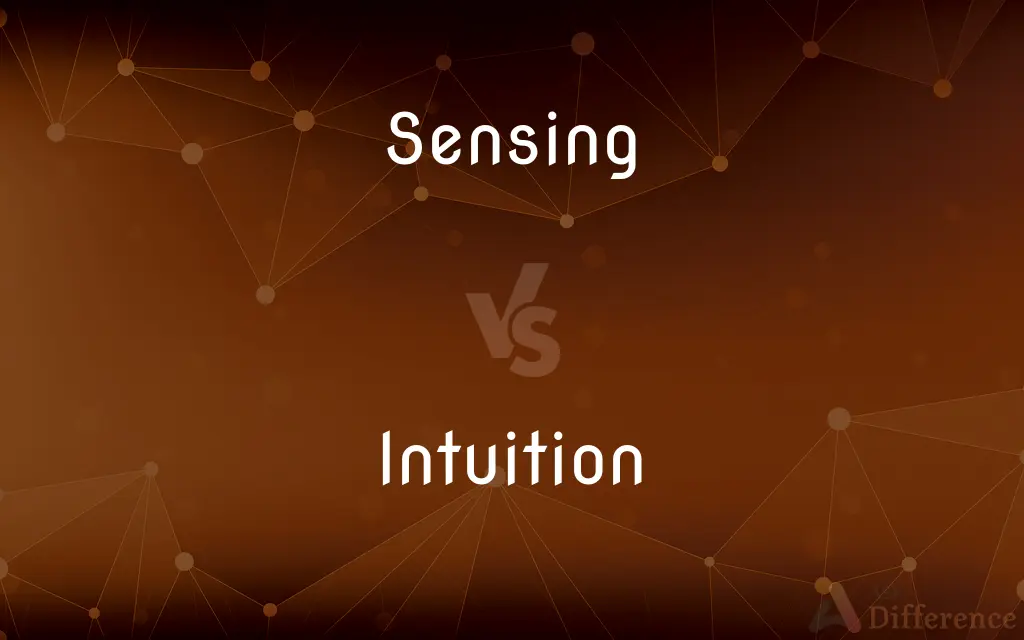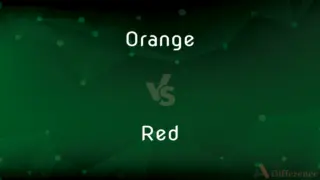Sensing vs. Intuition — What's the Difference?
By Fiza Rafique & Maham Liaqat — Updated on March 25, 2024
Sensing focuses on present realities and details, while intuition delves into patterns and possibilities beyond the immediate.

Difference Between Sensing and Intuition
Table of Contents
ADVERTISEMENT
Key Differences
Sensing involves a direct perception of the physical world, emphasizing concrete facts and details. On the other hand, intuition relies on abstract patterns and possibilities, often looking beyond what is immediately observable.
People with a sensing preference tend to trust information that is tangible and directly available through their senses. Whereas, those with an intuition preference are more inclined to interpret and add meaning to information, focusing on future implications.
Sensing individuals usually value practical applications and real-world examples in learning and communication. Conversely, intuitive individuals prefer exploring concepts and theories, often enjoying the process of brainstorming and imagining.
In decision-making, sensing types often base their conclusions on past experiences and observable facts. Intuitive types, however, are likely to consider future possibilities and innovative solutions, sometimes overlooking concrete details.
Sensing is characterized by a step-by-step approach to tasks and problems, paying close attention to detail. Intuition, in contrast, might approach tasks and problems with leaps, focusing on the big picture rather than the minutiae.
ADVERTISEMENT
Comparison Chart
Focus
Present realities, concrete details
Future possibilities, abstract patterns
Trust in
Direct information, tangible evidence
Interpretations, underlying meanings
Learning Style
Practical applications, real-world examples
Concepts, theories, brainstorming
Decision-making
Past experiences, observable facts
Future possibilities, innovative solutions
Approach
Step-by-step, attention to detail
Leaps, big-picture focus
Compare with Definitions
Sensing
Sensing individuals perceive the world through their five senses.
She relies on sensing to notice the intricate details in art.
Intuition
Intuition involves seeing patterns and possibilities.
His intuition helps him excel in strategic games.
Sensing
Values empirical evidence and direct observation.
Her sensing trait drives her passion for science experiments.
Intuition
Focuses on future possibilities and what could be.
Her intuition often leads her to predict trends accurately.
Sensing
Focuses on specifics and details.
His sensing nature makes him an excellent proofreader.
Intuition
Prefers theoretical over practical.
His intuition draws him to philosophical discussions.
Sensing
Concentrates on current facts and realities.
With his sensing preference, he excels in crisis situations.
Intuition
Sees beyond the immediate to innovative solutions.
Her intuition contributes to her creativity in design.
Sensing
Prefers practical and tangible outcomes.
Her sensing approach leads her to choose a hands-on career.
Intuition
Looks at the overall picture rather than details.
His intuition aids in managing complex projects effectively.
Sensing
Any of the faculties by which stimuli from outside or inside the body are received and felt, as the faculties of hearing, sight, smell, touch, taste, and equilibrium.
Intuition
Intuition is the ability to acquire knowledge without recourse to conscious reasoning. Different fields use the word "intuition" in very different ways, including but not limited to: direct access to unconscious knowledge; unconscious cognition; inner sensing; inner insight to unconscious pattern-recognition; and the ability to understand something instinctively, without any need for conscious reasoning.The word intuition comes from the Latin verb intueri translated as "consider" or from the late middle English word intuit, "to contemplate".
Sensing
A perception or feeling produced by a stimulus; sensation
A sense of fatigue and hunger.
Intuition
The ability to understand something instinctively, without the need for conscious reasoning
We shall allow our intuition to guide us
Sensing
Senses The faculties of sensation as means of providing physical gratification and pleasure.
Intuition
The faculty of knowing or understanding something without reasoning or proof.
Sensing
An intuitive or acquired perception or ability to estimate
A sense of diplomatic timing.
Intuition
An impression or insight gained by the use of this faculty
"I had this intuition you would come here just after the rain broke" (Carson McCullers).
Sensing
A capacity to appreciate or understand
A keen sense of humor.
Intuition
Immediate cognition without the use of conscious rational processes.
Sensing
A vague feeling or presentiment
A sense of impending doom.
Intuition
A perceptive insight gained by the use of this faculty.
Sensing
Recognition or perception either through the senses or through the intellect; consciousness
Has no sense of shame.
Intuition
A looking after; a regard to.
What, no reflection on a reward! He might have an intuition at it, as the encouragement, though not the cause, of his pains.
Sensing
Natural understanding or intelligence, especially in practical matters
The boy had sense and knew just what to do when he got lost.
Intuition
Direct apprehension or cognition; immediate knowledge, as in perception or consciousness; - distinguished from "mediate" knowledge, as in reasoning; as, the mind knows by intuition that black is not white, that a circle is not a square, that three are more than two, etc.; quick or ready insight or apprehension.
Sagacity and a nameless something more, - let us call it intuition.
Sensing
Often senses The normal ability to think or reason soundly
Have you taken leave of your senses?.
Intuition
Any object or truth discerned by intuition.
Sensing
Something sound or reasonable
There's no sense in waiting three hours.
Intuition
Any quick insight, recognized immediately without a reasoning process; a belief arrived at unconsciously; - often it is based on extensive experience of a subject.
Sensing
A meaning that is conveyed, as in speech or writing; signification
The sense of the criticism is that the proposal has certain risks.
Intuition
The ability to have insight into a matter without conscious thought; as, his chemical intuition allowed him to predict compound conformations without any conscious calculation; a mother's intuition often tells her what is best for her child.
Sensing
One of the meanings of a word or phrase
The word set has many senses.
Intuition
Instinctive knowing (without the use of rational processes)
Sensing
Judgment; consensus
Sounding out the sense of the electorate on capital punishment.
Intuition
An impression that something might be the case;
He had an intuition that something had gone wrong
Sensing
Intellectual interpretation, as of the significance of an event or the conclusions reached by a group
I came away from the meeting with the sense that we had resolved all outstanding issues.
Sensing
To become aware of; perceive
Organisms able to sense their surroundings.
Sensing
To grasp; understand
Sensed that the financial situation would improve.
Sensing
To detect automatically
Sense radioactivity.
Sensing
(Genetics) Of or relating to the portion of the strand of double-stranded DNA that serves as a template for and is transcribed into RNA.
Sensing
Present participle of sense
Sensing
The act of sensation.
Sensing
The perception that something has occurred or some state exists;
Early detection can often lead to a cure
Sensing
Becoming aware of something via the senses
Common Curiosities
What type of information do intuitive individuals trust?
They trust abstract patterns, underlying meanings, and future implications.
What is the key difference between sensing and intuition?
Sensing emphasizes present realities and details, while intuition focuses on patterns and future possibilities.
How do sensing individuals approach tasks?
They approach tasks step-by-step, focusing on details and practical applications.
What careers might suit a sensing individual?
Careers that involve practical, hands-on work, such as engineering or healthcare.
What careers might suit an intuitive individual?
Careers that involve innovation and future planning, such as strategic planning or creative fields.
Is sensing better than intuition?
Neither is better; they are simply different ways of perceiving and interacting with the world.
How does an intuitive preference affect learning style?
Intuitive individuals enjoy exploring concepts, theories, and brainstorming possibilities.
Do sensing individuals struggle with abstract concepts?
They might find abstract concepts less engaging unless they see practical applications.
Can someone use both sensing and intuition?
Yes, most people use both to varying degrees, but usually prefer one over the other.
How does intuition influence decision-making?
Intuition influences decision-making by considering future possibilities and innovative solutions.
How does intuition help in strategic thinking?
Intuition helps in seeing beyond the present, allowing for strategic planning and foresight.
How does a sensing preference affect learning style?
Sensing individuals prefer learning through practical examples and direct application.
Is it possible to develop one's less dominant trait, sensing or intuition?
Yes, with mindfulness and practice, individuals can develop their less dominant trait to achieve a more balanced perspective.
Are sensing individuals less creative than intuitive ones?
Not necessarily; they may simply express creativity in more tangible, practical ways.
Can intuition lead to overlooking details?
Yes, intuitive individuals might sometimes overlook concrete details in favor of the bigger picture.
Share Your Discovery

Previous Comparison
Orange vs. Red
Next Comparison
Money vs. IncomeAuthor Spotlight
Written by
Fiza RafiqueFiza Rafique is a skilled content writer at AskDifference.com, where she meticulously refines and enhances written pieces. Drawing from her vast editorial expertise, Fiza ensures clarity, accuracy, and precision in every article. Passionate about language, she continually seeks to elevate the quality of content for readers worldwide.
Co-written by
Maham Liaqat















































